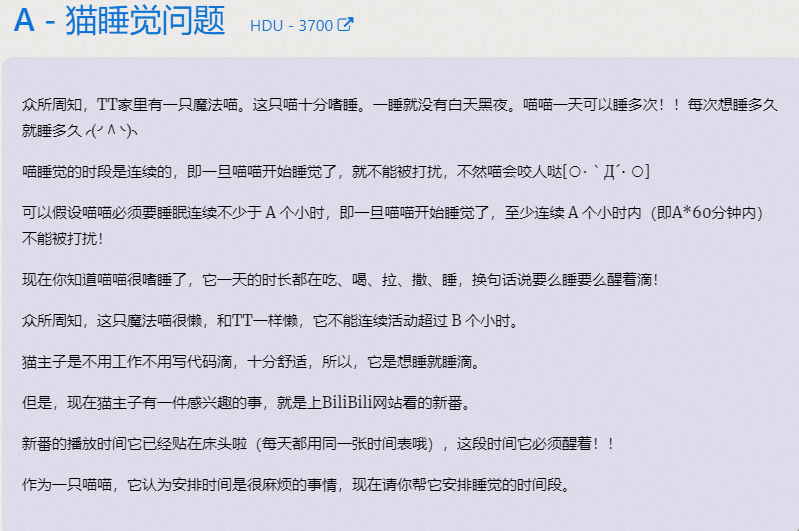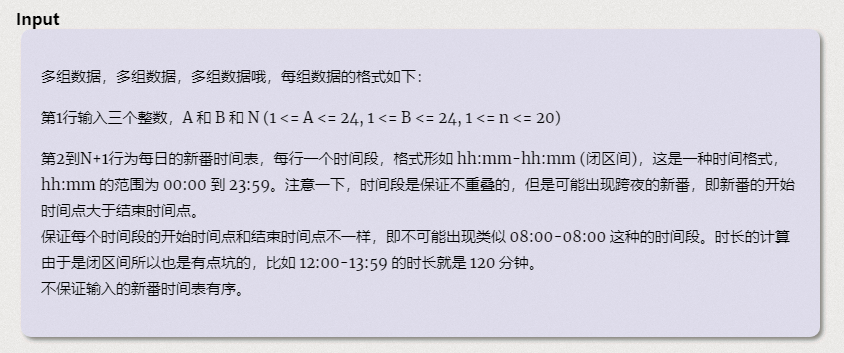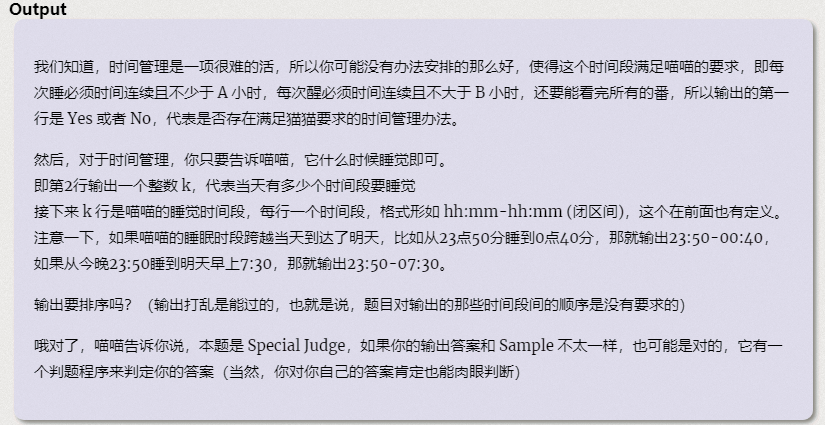Week14 猫睡觉问题
Week14 猫睡觉问题





思路分析:
关于这道题,真的是印象深刻,做这道题的时候真的心态爆炸,你以为你已经排掉坑了,结果又会发现还有更大的坑,当你苟延残喘排掉大坑,你以为你可以了,结果还有大坑等着你,实在是感人肺腑啊。当然这道题WA了很多。
当然这道题的基本思路还是简单的,首先是数据处理,对于大模拟数据格式的处理是非常常见的,我们把读入的时间格式统统转化成分钟,内部用分钟比较。然后做好格式转化的接口函数,方便读入输出。
第一步是读入数据,在读入的时候我们就要判断符不符合要求了,若醒的时间太长,则判定不符合题意。这是第一层判断。
第二步我们要维护一个醒着时间的节点,这个节点的开始和结束都记录着猫猫已经醒着的时间,然后我们遍历它的活动时间表,满足睡觉条件就睡觉,我们尽可能让猫多睡一会儿,每次判断时间间隔能不能睡觉,若可以睡,则直接睡觉,并把睡觉时间记录到答案ans中,方便输出结果,并更新猫猫醒着的时间。
我们是以一天为单位来做的,然后坑就来了,首先是过夜问题,及时间过了零点,这个也好解决,我们把过夜之后的时间加上一天就可以了。以为解决所有的坑了吗?还没有,考虑一下这种情况,就是猫猫在一天中24小时都醒着,而在题目的数据范围中这个是允许的,但是这是不能的情况,因为一天醒着,第二天就是48小时了,这个是不可以的,然后就是跨夜醒着的问题,因为前面我们的处理都是以一天为单位的,可能在跨夜的时候出现问题,比如,零点之前猫猫醒着,零点之后也醒着,两端时间单独都满足要求,但是加一起就不可以了。我们在后面加一个判断即可解决这个问题了。

#include <iostream> #include <string> #include <cstring> #include <algorithm> #include <vector> using namespace std; #define maxn 20 struct node { int s; int e; }; vector<node>v; int day = 24*60; node actnod[maxn+5]; //时间转换 输入 str 00:00-22:22 , &start , 返回end 转化成分钟 int timeconv(string str,int &start){ if(str.length()!=11){ // cout<<"testerror"<<endl; } for(int i=0;i<str.length();i++){ str[i]=str[i]-'0'; } int sum=0; int temp=(str[0])*10+str[1]; sum=temp*60; temp=str[3]*10+str[4]; sum+=temp; start=sum; sum=0; temp=str[6]*10+str[7]; sum=temp*60; temp=str[9]*10+str[10]; sum=sum+temp; return sum; } int callength(int start,int end){ if(end-start<0){ return end+day-start+1; }else{ return end-start+1; } } bool cmp(const node &a, const node &b) { return a.s<b.s; } int main(){ int a, b; int n; int i; bool flag; char str[20]; node temp, x; while(~scanf("%d %d", &a, &b)){ a *= 60; b *= 60; scanf("%d", &n); for (i=1; i<=n; i++) { scanf("%s", str); actnod[i].s = (str[0]-'0')*600+(str[1]-'0')*60+(str[3]-'0')*10+(str[4]-'0'); actnod[i].e = (str[6]-'0')*600+(str[7]-'0')*60+(str[9]-'0')*10+(str[10]-'0'); if (actnod[i].e<actnod[i].s) actnod[i].e += day; } sort(actnod+1, actnod+n+1, cmp); v.clear(); flag = false; for (i=1; i<=n; i++) { if (actnod[i].e-actnod[i].s+1>b) { flag = true; break; } } if (!flag) { temp.s = actnod[1].s; temp.e = actnod[1].e; for (i=1; i<n; i++) { if (actnod[i+1].s-1-temp.e>=a) { x.s = temp.e+1; x.e = actnod[i+1].s-1; if (x.s!=x.e) v.push_back(x); temp.s = actnod[i+1].s; temp.e = actnod[i+1].e; } else { temp.e = actnod[i+1].e; if (temp.e-temp.s+1>b) { flag = true; break; } } } } if (!flag) { if (actnod[1].s+day-1-temp.e>=a) { x.s = (temp.e+1)%day; x.e = (actnod[1].s-1+day)%day; if (x.s!=x.e) v.push_back(x); } else if (v.size()>0 && (v[1].s-1+day)%day-temp.s+1<=b) { } else flag = true; } if (flag || v.size()==0) printf("No\n"); else { printf("Yes\n%d\n", v.size()); sort(v.begin(), v.end(), cmp); for (i=0; i<v.size(); i++){ int temp1=v[i].s; int h1=temp1/60; int f1=temp1%60; temp1=v[i].e; int h2=temp1/60; int f2=temp1%60; printf("%02d:%02d-%02d:%02d\n",h1,f1,h2,f2); } } } return 0; }




